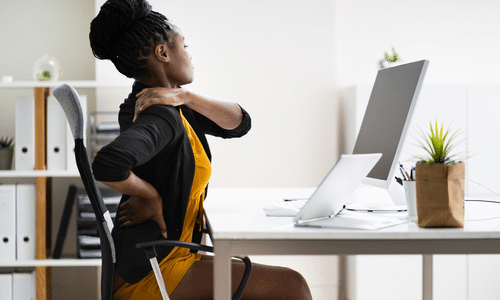Stop Work-Related Back Pain
- Created inNewsletter Library
How to Prevent Back Pain While Working
It’s hard to focus on your job when your back hurts. Unfortunately, standing or sitting for hours can stress your back and worsen your aches and pains. These eight tips can help you reduce or prevent job-related back pain.
1. Change Your Position Often
Stress and strain on your back are more likely to occur when you remain in the same position for a long time. Whether you work in construction, drive a truck, or spend the day in an office, changing your position regularly will reduce the strain on your back.
Breaks don’t have to be long to be effective. A five-minute standing or stretching break every hour or two will decrease the effects of stress and strain. If you spend most of your shift standing, incorporate a few sitting breaks into your day if possible.
2. Switch to Ergonomic Office Furniture
Ergonomic office furniture reduces stress on your back and improves your sitting posture. Office chairs designed with ergonomic features support the lumbar curve in your lower back and reduce slouching and back strain. Spine-health notes that your chair will be properly adjusted for your height if:
- Your arms are even with the top of your desk.
- Your feet are flat on the floor. (A small footstool can be helpful if your feet don’t quite reach the floor.)
- Your thighs are horizontal.
Ergonomic furniture is just as important whether you work in an office, factory, or at home. Your kitchen chair or couch probably don’t offer adequate support for your back and may contribute to slouching or posture problems.
3. Practice Safe Lifting Techniques
You’re more likely to strain the muscles and ligaments in your back if you don’t use proper lifting techniques or lift an item that’s too heavy for you to safely handle by yourself. When you lift a box or other heavy objects, crouch down and bend your knees. Bending your knees while lifting makes it easier to use your strong leg muscles and limits strain on your back muscles.
Keep the item close to your chest, and don’t twist while you lift. Try picking up a corner of the box before you lift it. If it feels too heavy, ask for help or use machinery to move the item.
4. Wear Supportive Shoes
Your shoes may be a contributing factor in back pain. Your feet support the weight of your body and help keep your spine properly aligned. If your shoes aren’t supportive, you’ll be much more likely to experience back, hip, or leg pain. Wearing shoes with supportive arches or adding orthotics to your shoes can be helpful. Orthotics are custom-made shoe inserts that support your feet and keep them properly positioned in your shoes.
5. Try Stress Reduction Techniques
Stress can cause back pain or make it worse. In fact, 29 percent of Americans surveyed by Statista said that they thought stress was the source of their back pain. When you’re stressed, the muscles in your back, shoulder, and neck become tense, which can lead to pain and headaches. Meditation can be helpful, but participating in any activity you enjoy may lower your stress level.
6. Lose Weight
If you’re above your ideal weight, losing a few pounds will reduce stress on your back and your joints. In addition to straining your back muscles, being overweight or obese increases your risk of degenerative disk disease and arthritis in your spine.
7. Stop Smoking
Smoking can cause faster deterioration of the discs between the vertebrae in your spine, reduce blood flow to the ligaments and muscles in your back, and slow healing if you injure your back. In a U.S. study published in Cureus in 2016, 36.9 percent of current smokers reported back pain compared to just 23.5 percent of people who had never smoked.
8. Visit Your Chiropractor
Regular visits to your chiropractor will reduce the effects of stress and strain on your back. Back pain often occurs when the vertebrae in your back become misaligned. Misalignments stress joints, muscles, ligaments, and tendons, and can press on nerves causing increased pain. Spinal manipulations, commonly called adjustments, realign the spine, easing pain. Massage, traction, ultrasound therapy, and other chiropractic treatments may also be part of your treatment plan.
Work doesn’t have to be a painful experience. We offer the treatments you need to relieve your back pain naturally. Call our office to schedule your chiropractic appointment.
Sources:
Cureus: Association Between Smoking and Back Pain in a Cross-Section of Adult Americans, 9/16
Mayo Clinic: Back Pain at Work: Preventing Pain and Injury, 5/22/19
Spine-health: Choosing the Right Ergonomic Office Chair, 7/2/04
OrthoInfo: Preventing Back Pain at Work and at Home
Statista: Back Pain in the U.S. – Statistics & Facts, 11/21/19
